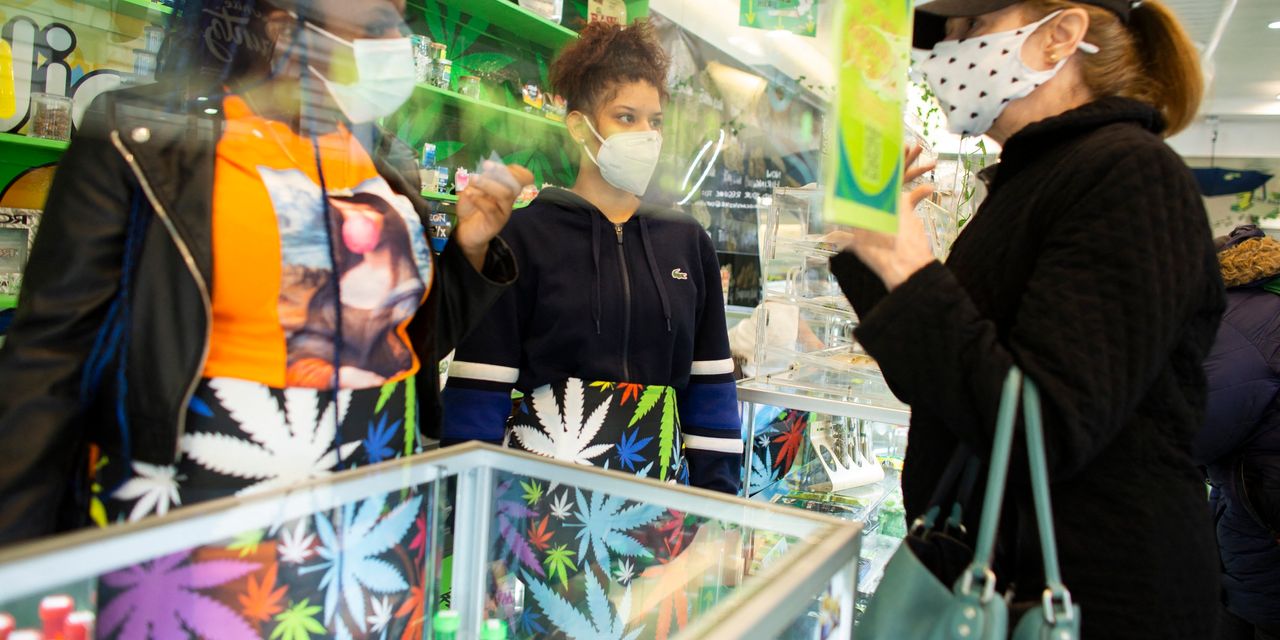
After years of political wrangling and lobbying by advocacy groups, New York state has legalized cannabis for adult recreational use in a move that’s expected to shake up the industry, inspire other states to follow suit and help light a fire under the effort to reform the U.S.’s still-strict cannabis laws. However, some experts say the state’s 13% tax may be too high to compete with New York’s robust black market.
Gov. Andrew Cuomo signed the bill early Wednesday and called it a historic day for the state, which is expected to become the second biggest cannabis market in the U.S., behind only California.
“New York is such a juggernaut and such an influencer, it will have a domino effect on the whole East Coast,” said Rob DiPisa, co-chairman of the cannabis-law group at the law firm Cole Schotz.
Charles Gormally, co-chairman for cannabis law at Brach Eichler, agreed. “New York residents favor legalized cannabis by a wide margin, so it is welcome relief to the citizenry that this state will move ahead with creating a regulated cannabis marketplace for adult use,” said Gormally. “There seems to be a genuine commitment to move forward at a brisk pace, perhaps motivated by the reality that failing to do so will cede the marketplace to states like New Jersey that are on the way to creating a regulated and taxed marketplace for cannabis.”
See now: To profit from planned merger of Tilray and Aphria, buy Aphria, says this analyst
The New York bill, called the Marijuana Regulation and Taxation Act, will allow adults 21 and over to purchase marijuana and grow up to six plants at home. The state’s existing medical cannabis operators will be allowed to operate three adult-use stores, co-locating them with their medical dispensaries.
The bill is strongly focused on social equity, ensuring that communities and individuals who suffered the most under the years-long “War on Drugs” can and will benefit from legalization. Convictions for nonviolent cannabis-related crimes will be expunged, and people who have sold cannabis illegally in the past will be able to apply for licenses.
“ ‘The legal market needs a trifecta of the same product, same services and cost that is somewhat competitive with the black market.’ ”
“The MRTA does not just legalize the adult use of marijuana, but it rights decades of disproportionately targeting people of color, ensures they are included in the legal marijuana industry and reinvests in education and in communities that have been harmed,” said Assembly Speaker Carl Heastie in a statement from Cuomo’s office announcing the deal.
See now: Cannabis stocks rally after Chuck Schumer leads drive for reforms that may end federal prohibition
Crucially, the program will offer low- or zero-interest loans and incubator programs to individuals from those communities, providing them with the financial means to get a foothold in the industry.
“That sets a new bar on social equity, and it’s an important part of eliminating the black market,” said DiPisa. “You need to provide an entry point for individuals that have been involved in the industry for years. Without that, the black market will continue.”
The black market is the biggest challenge facing New York, as it is one of the most sophisticated in the country, and has included services such as home delivery for years, said DiPisa. New Yorkers have in some cases had relationships with dealers extending over a decade or more and will expect a high level of convenience and personal service from the legalized cannabis business.
What’s more, “consumers have become much more educated, they like to see testing reports and QR codes to know exactly what’s going in their bodies,” he said. “The black market already has those products from other adult-use states. The legal market needs a trifecta of the same product, same services and cost that is somewhat competitive with the black market.”
“ Cannabis products will be subject to a 13% tax in New York state, 9% of which will be directed to state coffers and 4% to localities. ”
Cannabis products will be subject to a 13% tax, 9% of which will be directed to state coffers and 4% to localities. A wholesale tax will be applied to products based on potency, rather than weight, of a half-cent per milligram for flower, eight-tenths of a cent per milligram for concentrated cannabis and 3 cents per milligram for edibles. That’s a big improvement from an original plan to impose a 20% tax, a move that experts say would have crushed the sector and allowed the black market to continue to thrive.
“It’s a step in the right direction, but it may still be too high,” said DiPisa, who expects the black market to coexist for at least the next five to 10 years. “But the legal market has to start somewhere, and we’ll see what happens over time.”
Cuomo has said he expects legalization to create more than 60,000 jobs, to spur $3.5 billion of economic activity and to generate more than $350 million in tax revenue once the program is fully up and running. That money is much needed given the $15 billion deficit the state is facing, with revenue having been decimated by the coronavirus pandemic.
The program will also create a new state regulator to oversee products. Some of the revenue raised will be diverted for reinvestment in communities that were most impacted by draconian drug laws in the form of education, drug treatment and prevention programs.
Nathaniel Gurien, chief executive of Fincann, an advisory and consulting firm that specializes in cannabis banking and payment systems, said minority investors should think more broadly about how to access the sector.
“Chasing cannabis licenses may be ‘fool’s gold’ especially for minority equity candidates once federal legalization permits every corner convenience store to sell pre-rolls,” he said. “It might be wiser to apply current skills [and] experience combined with newly acquired skills [and] capital provided by equity programs to launch a niche business, [for example] tourism, professional services, equipment, horticulture — the possibilities are endless, barriers to entry are low, and prospects for long-term prosperity are greater.”
Cuomo said he expects the sector to be up and running in 2022, but it may take longer than that. Members of the new regulatory entity need to be appointed, regulations need to be drafted and approved, and licenses awarded. The state will also need to expand cultivation and grow more cannabis, which for now is confined to plants grown for the medical market.
New York is the 17th state to legalize cannabis for adult use and is expected to boost reform efforts. Cannabis is still classified as a Schedule I drug at the federal level, grouping it together with heroin. Senate Majority Leader Chuck Schumer has said he would make reform legislation a key priority in the current Congress, bolstering hopes for an end to federal prohibition.
Cannabis stocks, including Canadian licensed producers, rallied on Wednesday, with the Cannabis ETF THCX, +1.04% up more than 2.6%. Curaleaf Holdings Inc. CURLF, +0.33% CURA, -0.94% was up 2.9%, Cresco Labs Inc. CL, +2.77% was up 5.4% and Trulieve Cannabis Corp. TCNNF, +0.59% TRUL, +0.79% was up 3.9%.
Greenlane Holdings Inc. GNLN, +5.71% was up 24% after the announcement of a merger with KushCo Holdings Inc. KSHB, +1.63% to create a leader in cannabis accessories.





